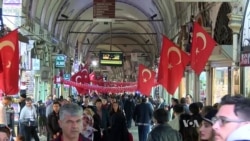The rising influence of Kurdish voters is a central issue in Turkey's parliamentary elections being held Sunday to break a tense political deadlock. The poll is taking place after elections in June were inconclusive and coalition talks with the party of President Racep Tayyip Erdogan failed.
Many Kurds say their long-term aspirations are for an independent Kurdish state, but the majority say they want to work within the framework of Turkey's democratic system to achieve their shorter-term goal of greater autonomy.
In Istanbul’s bustling Grand Bazaar, where Kurds — like everywhere else in Turkey — were banned from speaking the Kurdish language, some blamed politicians of both Erdogan’s Justice and Development Party and opposition leftists for sowing discord ahead of the poll.
“We call for peace. They call for war, and we will answer that with another call for peace,” said Firat Demiral, a 26-year-old vendor and a Kurd.
Surveys show a majority of Kurds do not want to force the issue of a separate state for now, and most do not support the armed rebellion led by the Kurdistan Workers Party, which the Turkish government considers a terrorist organization and has been battling for decades in the east of the country.
“Demand for a federal state is not strong at all among Kurds,” said Mesut Yegen, a sociologist at Istanbul Sehir University who recently researched the issue in 11 provinces of eastern Turkey, a region that Kurds consider their ancestral homeland and refer to as Kurdistan, a term the Turkish government does not recognize.
Turkey’s Kurds demand more autonomy for local governments in their regions. They also want Kurdish to be the language of instruction in their public schools.
A majority of Kurds surveyed also favor a general amnesty for Kurdish rebels and their disarmament as the only way to end the decades-old conflict.
Many Kurds see the democratic process as the way forward.
Tensions high
They head to the polls Sunday despite persistent rumors that violence might erupt if Erdogan’s party unexpectedly wins the additional 18 seats that it failed to clinch in the June elections, thereby losing its majority in parliament.
For the Kurdish-dominated HDP, the climate of tension also raises awareness of the Kurds’ cause, both here and abroad. “These elections are important because the ruling party and the government are waging a dirty war. It’s the first time in history that we get the chance like this atmosphere to recognize Kurdish rights with elections,” said Rukiye Demir, a Kurdish political organizer who has been jailed in the past for her political activities.
The HDP won only 13 percent of the vote in the June elections, and with its Kurdish support base alone, it has no chance of ever being a majority. It is drawing support from other sectors of Turkish society and is reaching out to ethnic Armenians, LGBT groups and leftists. Still, non-Kurds make up only 2 percent of the party’s base.
The party stands to benefit from a coalition government that would be inevitable if Sunday’s poll fails to yield a solid majority for Erdogan’s party.
“This trend is sort of growing," said Yegen, the sociologist. "HDP, which used to be pro-Kurdish party in the past, is sort of opening itself to non-Kurdish sectors of society.”
Vote to be scrutinized
Tens of thousands of election monitors fanned out to polling stations across Turkey in response to concerns by the opposition that the poll may not be free and fair. Officials of Vote and Beyond, the largest of the groups, said the number of volunteers on Sunday could reach 100,000.
Monitors are watching for signs not only of vote-rigging at the polls, but also for structural problems. “We’re looking at things such as the candidate registration process, the voter registration process,” said Thomas Rymer of the Office for Democratic Institutions and Human Rights, a Europe-based organization.
In the run-up to Sunday’s election, Turkish authorities have been cracking down on media organizations and journalists, including Kurdish reporters, who have been critical of the Erdogan government.
The clampdown on the media and on Kurdish citizens in the country’s east does not sit well with many non-Kurds, who also blame the government for polarization.
At the Grand Bazaar, it is not uncommon to see integration — including business partnerships between Kurds and non-Kurds. Sabit Donmez, 62, a clothing merchant, blamed politicians for the divisions ahead of the poll.
“Nobody has problems with others. We sit with people who come from the southeast. My business partner is also from the southeast, and we are working together perfectly. Our wives, our children like each other," said Donmez, whose family has intermarried. “One of my sons-in-law is also Kurdish from the southeast. It means the problem can be solved. When people can live together and the politicians want to solve it, it can be solved.”





